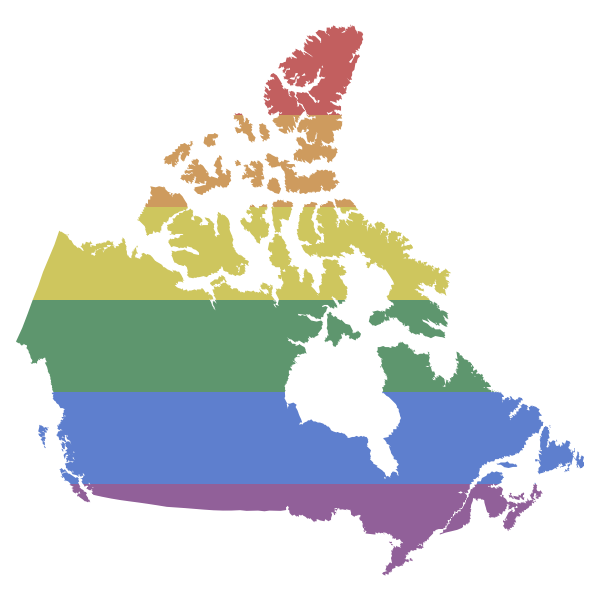- Homosexuality
- ⚢✔ Legal
- Gay Marriage
- ⚭✔ Legal
- Censorship
- ✔ No censorship
- Changing Gender
- ✔ Legal, no restrictions
- Gender-Affirming Care
- ✔ Legal
- Non-Binary Gender Recognition
- ✔ Recognized
- Hate Crime Protections
- ✔ Sexual orientation and gender identity
- Discrimination
- ✔ Illegal
- Employment Discrimination
- ✔ Sexual orientation and gender identity
- Housing Discrimination
- ✔ Sexual orientation and gender identity
- Adoption
- ✔ Legal
- Intersex Infant Surgery
- ✖ Not banned
- Military
- ✔ Legal
- Donating Blood
- ✔ Legal
- Conversion Therapy
- ✔ Banned
- Age of Consent
- ✔ Equal
Public Opinion
Surveys in Canada have shown mixed views towards LGBTQ+ rights and issues.
How comfortable would you be in each of the following situations- If you had a next-door neighbor who was gay, lesbian, or bisexual?
How comfortable would you be in each of the following situations- If you had a next-door neighbor who is a transgender person?
How comfortable would you be in each of the following situations- If you had a manager or supervisor who is gay, lesbian, or bisexual?
Perception of LGBTQ+ People
Survey results from 115 LGBTQ+ Equaldex users who lived in or visited Canada.
Overall
Perceived Safety**Survey results represent personal perceptions of safety and may not be indicative of current actual conditions.
Equal Treatment
Visibility & Representation
Culture
Services
History
Homosexual activity in Canada is legal.
In 1893, the gross indecency law became part of the country’s first Criminal Code. The original language of the law referred only to homosexual acts between men, as sex between women was typically ignored at the time.
The military drummer, who was the man convicted, was found guilty and was sentenced to death. However, Jesuits stepped in and were able to transfer the case to Québec City, where his life was sparred.
From then until 1893, few known cases exist of homosexuals being sentenced to death.
Same-sex marriage in Canada is legal.
Censorship of LGBT issues in Canada is no censorship.
Right to change legal gender in Canada is legal, no restrictions.
Gender-affirming care in Canada is legal.
To qualify, applicants had to be employed, be straight, never have been convicted of a crime, have lived as their identified gender for at least two years, and have changed all their legal documents.
Legal recognition of non-binary gender in Canada is recognized.
Other IDs are under provincial/territorial jurisdiction. Only Nunavut currently has no legal recognition for non-binary identities.
LGBT discrimination in Canada is illegal.
LGBT employment discrimination in Canada is sexual orientation and gender identity.
Provincial human rights acts are separate, but Supreme Court precedent exists for requiring provinces to protect the same classes as the Canadian Human Rights Act. At this time all provinces protect against employment discrimination on the basis of sexual orientation. Of the provinces only Ontario has explicit protection on the basis of both gender identity and gender expression in its human rights code, though several provide implicit protections on the basis of gender identity or "transsexualism" under the category of "sex" or "gender".
Intersex infant surgery in Canada is not banned.
Serving openly in military in Canada is legal.
Blood donations by MSMs in Canada is legal.
LGBT Rights by Province
View the LGBT laws in each individual province of Canada.
- Prince Edward Island
- Quebec
- Saskatchewan
- Northwest Territories (Territory)
- Nunavut (Territory)
- Yukon (Territory)





